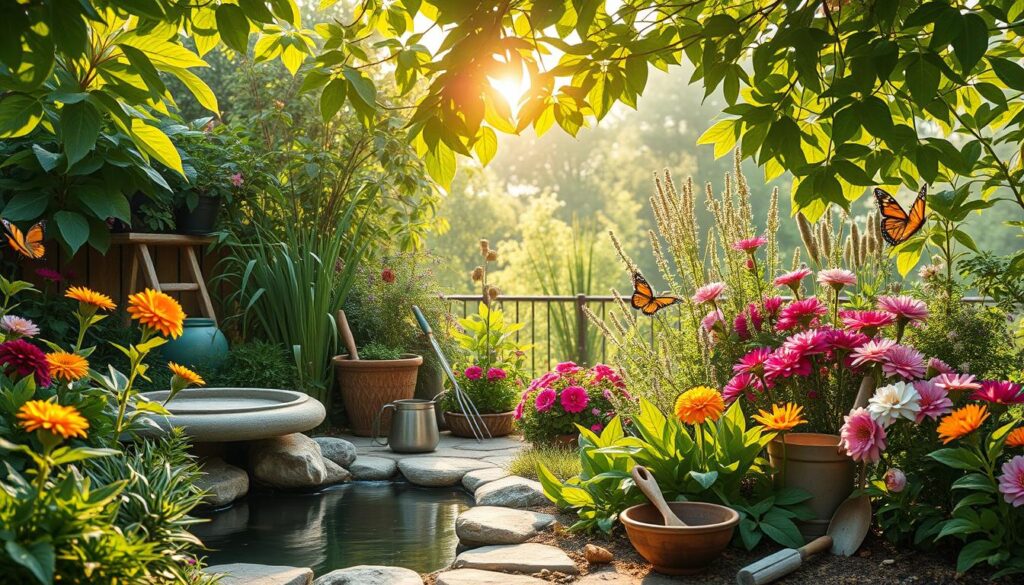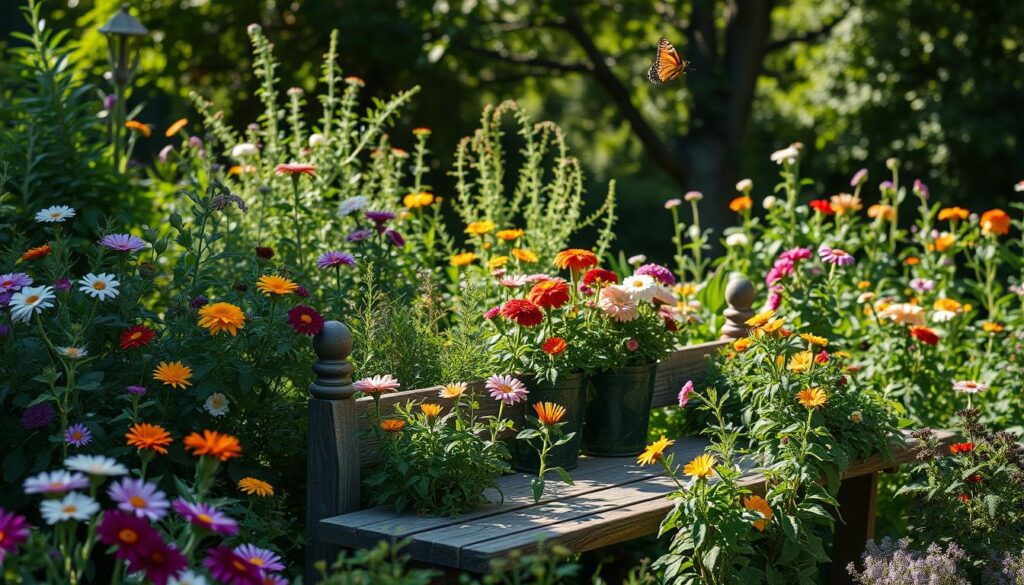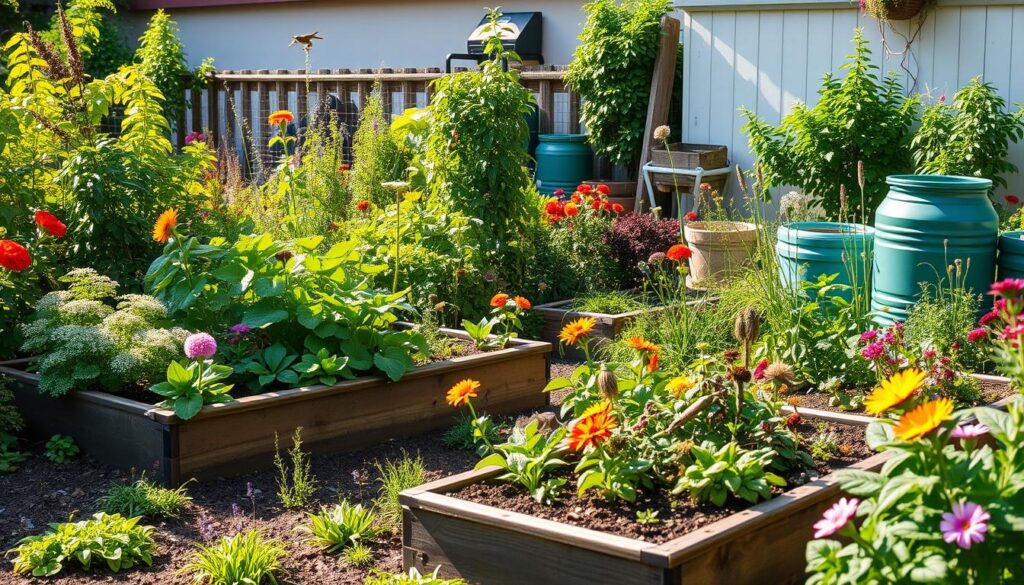The future will be what we make it. And it starts now. Barack Obama. This quote is very meaningful as we face the growing eco-anxiety in our communities and among the young. More and more people, especially those 16-24, are feeling anxious about the environment. This anxiety is linked to issues like climate change, pollution, and the loss of species.
This eco-anxiety is a big problem for our mental health and our plans for the future. To tackle this, we need solutions. Mindful gardening is one such solution. It helps us connect deeply with nature, which is very beneficial for our well-being.
Gardening activities can make us feel more hopeful and less helpless. It gives us a sense of purpose and emotional relief. This is especially important when we feel overwhelmed by ecological threats.
Studies show that being in nature improves our mental health. People who spend time outdoors feel less stressed, anxious, and negative. Mindful gardening can help us feel better and more resilient in the face of climate challenges.

Key Takeaways
- Eco-anxiety is increasingly affecting younger generations, leading to anxiety around ecological crises.
- Mindful gardening offers emotional and psychological respite from environmental worries.
- Engaging with nature enhances mental well-being and fosters resilience.
- Community involvement significantly reduces feelings of eco-anxiety.
- Mindfulness practices can further deepen the connection to nature.
- Investing time in natural activities has profound health benefits.
The Rise of Eco-Anxiety in Today’s Society
Climate change is a big worry now, and eco-anxiety is growing. It’s the emotional stress from environmental problems and fear of ecological disasters. Young people are especially worried, feeling the pressure of climate change.
Understanding Eco-Anxiety
Eco-anxiety makes people feel scared, vulnerable, and hopeless about the planet’s future. The constant bad news about climate change makes it worse. Many therapists are now helping with eco-anxiety, using eco-therapy to focus on mindfulness and caring for the environment.
Who is Most Affected by Eco-Anxiety?
Young people, especially those 16 to 25, are hit hard. About 60% of them are very worried about climate change. Parents are worried too, especially about having kids in a world with global warming.
The emotional toll of climate change can lead to serious mental health issues. These include anxiety and depression.
The Impact of Climate Change on Mental Health
Climate change affects mental health a lot. Two-thirds of Americans are worried about it. This worry can really hurt people’s lives and mental health.
But, getting involved in the community can help. Joining local groups or taking action can make people feel more in control. It gives them a sense of purpose and helps fight off feelings of helplessness.
The Therapeutic Benefits of Connecting with Nature
Connecting with nature offers deep healing for our emotions and minds. Natural places create a calm atmosphere that lowers stress and helps our minds heal. Activities like outdoor therapy or walks in parks bring many mental health benefits.
Nature as a Healing Space
Nature is more than just a pretty view; it’s a healing space for our minds. Studies show that being in nature can cut anxiety and depression by up to 36% compared to city life. Nature’s calm helps us relax and feel better for hours after we leave.
Scientific Evidence Supporting Nature Therapy
Science backs up the good effects of nature on our mental health. About 55% to 65% of people see lasting benefits from nature therapy. Forest bathing, for example, can lower stress hormones by 12% to 16%.
This natural therapy not only eases mental pain but also boosts our immune system. Studies show it can increase immune cells by up to 50%.
Mindful Gardening: Reducing Eco-Anxiety Through Nature
Gardening connects us with nature, offering deep mental health benefits. It’s not just a hobby but a way to heal and feel better. By planting and caring for plants, we can change our mental state for the better.
How Gardening Cultivates Mental Well-being
Gardening is a strong way to fight stress and boost mental health. Research shows it can lower stress hormones, making us feel calmer. People who garden often feel happier and more fulfilled. It can even lower the risk of dementia by up to 36%, showing gardening’s impact on our minds.
Engaging Senses in the Garden
Gardening engages our senses, connecting us to the world around us. We touch, see, smell, and hear nature’s beauty. This connection helps us feel grounded and mindful. It also makes us feel proud and boosts our self-esteem when we harvest our own food.

| Benefit | Impact |
|---|---|
| Reduces cortisol levels | Lower stress and anxiety |
| Improves mood | Higher happiness levels |
| Enhances cognitive functions | Improved memory retention |
| Boosts self-esteem | Greater personal satisfaction |
| Encourages flexibility and balance | Better physical health |
Practical Tips for Mindful Gardening
Creating a mindful garden is a chance to slow down and enjoy the world around us. It’s important to plan carefully to make a space that’s full of sensory delights and good for the planet. Here are some tips to help you start your eco-friendly gardening journey.
Creating a Mindful Garden Space
Start by picking a quiet spot for your garden. Choose plants that are good for your local climate and attract pollinators. Think about adding:
- Colorful flowers to attract beneficial insects and provide visual delight.
- Herbs like basil and mint that enhance culinary experiences.
- Vegetables that encourage sustainable practices and self-sufficiency.
Notice the sounds, textures, and smells around you. Adding cozy seating spots can make your garden even more enjoyable. Seeing how these elements work together helps you stay mindful in your garden.
Techniques for Sustainable Gardening Practices
Using eco-friendly gardening methods is good for your mind and the planet. Here are some important practices to try:
- Choose native plants that need less water and care, helping your garden be sustainable.
- Use water-saving methods like drip irrigation and collecting rainwater.
- Go organic to avoid chemicals that harm local ecosystems.
- Apply permaculture principles to create systems that help plants and animals thrive.
- Be patient and let plants grow at their own pace, rather than rushing for quick results.
By using these gardening techniques, you’ll learn more about nature and connect with it in a deeper way. Mindful gardening brings peace and purpose into your everyday life.

Community Involvement and its Role in Reducing Eco-Anxiety
Getting involved in your community is key to fighting eco-anxiety. It offers chances to work together and share ideas. Joining local gardening groups helps you meet others who care about the environment.
These groups help you feel connected and part of something bigger. They also teach you about living sustainably. This can make you feel less alone and more hopeful.
Joining Local Gardening Groups
Being part of a gardening group is more than just growing plants. A study in Singapore showed gardeners feel happier and more connected than others. This is because they support each other and share experiences.
In a world filled with worries, these groups offer a safe space. They help you grow as a person and improve your gardening skills.
The Power of Community Gardens
Community gardens are special places for working together and learning. They help create spaces that are good for both people and nature. By doing this, they build strong bonds between people.
Being around nature in these gardens can also make you feel less stressed. So, community gardens are not just green spaces. They are essential for our mental health and fighting eco-anxiety.
FAQ
What is mindful gardening?
Mindful gardening is a way to connect with nature. It helps ease worries about the environment. It makes you feel better by using your mind and body in gardening.
How does eco-anxiety affect mental health?
Eco-anxiety is feeling scared and worried about the planet. It can make you feel stressed, anxious, and sad. These feelings can last a long time.
What are the mental health benefits of nature therapy?
Being in nature is good for your mind. It can lower stress, make you feel happier, and improve your mood. Activities like walking in nature or meditating outside help a lot.
How can gardening help reduce stress?
Gardening is calming because it involves your senses. Planting, caring for, and harvesting plants makes you feel accomplished. It can really help reduce anxiety.
What practices contribute to creating a mindful garden?
To make a mindful garden, plan carefully. Use native plants and save water. Organic gardening is also key. It makes your garden healthy and engaging for your senses.
Why is community involvement important in combating eco-anxiety?
Gardening with others helps you feel connected. It’s a way to work together for a greener future. It fights feelings of loneliness and gives you a sense of belonging.
What are some eco-friendly gardening practices?
Eco-friendly gardening means using organic and sustainable methods. It’s about caring for the planet while enjoying nature. It’s good for your mind and the environment.
How can I get started with mindful gardening?
Start by picking a spot for your garden. Choose plants that you like. Spend time in your garden, focusing on your senses. This is how you begin.
Source Links
- Reducing Eco-Anxiety Through Nature Connection: The Healing Power of the Natural World — An Darach Forest Therapy
- Spend Time in Nature to Reduce Stress and Anxiety
- The Rise Of Eco-Anxiety: How Can We Learn To Cope? | Garden Culture Magazine
- I felt a “gut-wrenching, ever-present guilt that I wasn’t doing enough to save nature.” Eco-anxiety is on the rise – here’s how to tackle it
- Keeping your cool in a warming world: 8 steps to help manage eco-anxiety
- Eco-Therapy: Nature’s Healing Power For Mental Wellbeing
- Eco-Therapy and the Mental Health Benefits of Nature – Immunize Nevada
- Mental Health Gardening: How Gardening Can Improve Your Mental Wellbeing – Naked Sustainability
- 11 Surprising Ways Being in Nature Can Boost Your Mental Health – Grow Therapy
- 5 Simple Steps to Start Mindful Gardening for Inner Peace
- The Therapeutic Aspect of Gardening: Cultivating Mindfulness – EFI
- Community Gardening: Stress, Well-Being, and Resilience Potentials
- Group Nature-Based Mindfulness Interventions: Nature-Based Mindfulness Training for College Students with Anxiety




